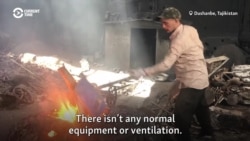As China’s scrap-metal needs evolve, small, scrap-metal factories in neighboring Tajikistan that long have sparked complaints about environmental pollution are beginning to close. Three such factories out of a former 25 still remain in the capital, Dushanbe, but one senior environmental-control official told Current Time that these, too, could soon shut down.
Many of these factories have Chinese owners – a reflection of the role of China, Tajikistan’s eastern neighbor, as one of the world’s largest importers of scrap metal.
In 2017, China was the destination for 79 percent of Tajikistan’s exports of ores other than iron and copper. The product accounted for 76 percent of the $45.8 million China spent on Tajik imports.
In the past, aside from China’s need for scrap metal, Tajik demand for cheap building materials and jobs also kept these mini-plants open, despite apparent violations of environmental and worker-safety regulations.
But, now, China has invested $200 million in a large metallurgical combine in the northern Tajik town of Istiklol. Consequently, demand is expected to dwindle for the lower volumes of metal that small factories can produce.
At the same time, China’s own demand for scrap metal has started to decline. Between April and June of this year, the country reduced such imports by a staggering 87 percent – officially, as part of its “war against pollution,” the industry publication Mining Technology reports.
What that will mean for the overall Tajik scrap-metal market is unclear, but In Dushanbe, Saidusmon Sudurov, a department manager for the national Environmental Protection Committee, had no doubts about the fate of Dushanbe’s three remaining scrap-metal plants: “[T]hey, more likely than not, will close in the near future.”





